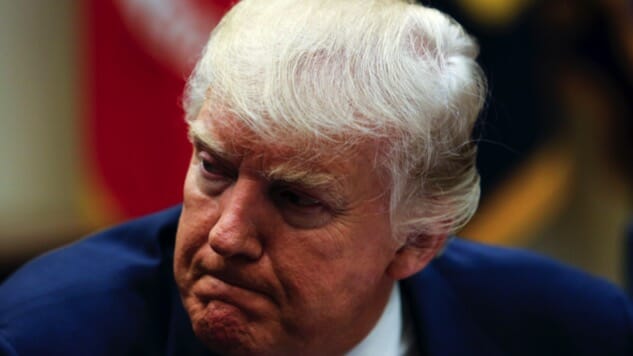How to Be a Man in the Trump Era
Photo courtesy of Getty
Why isn’t Donald Trump wearing a dress? Why isn’t that something that’s happening right now? This is a bit of fairly deliberate concern trolling, sure, but part of me is genuinely, honestly curious, too. Why isn’t DJT walking out to a lectern in the latest from Diane von Furstenberg, offering us a spin so we can get a sense of the entirety of the dress, and then proceeding with whatever his remarks would have been? Why isn’t he skipping through the Brady Briefing Room with a rose between his teeth, kicking one of his feet backward in something resembling joyous abandon?
The toxic masculinity on display from Trump we’ve seen over time (and will no doubt see in the future) may seem to be the least of our most pressing worries at the moment—doubly so if you support the man—but it’s important to take the time to divorce the ideas of healthy masculinity and healthy whiteness from what Trump represents. And, by that, I don’t mean the fact that a voter wanted Trump to be a role model for his daughters, though that’s important, and I’m not referring to the fact that fifth graders see Trump as a bully, though that’s important, too.
This is about what happens when those small, seemingly inconsequential ticks of behavior get wedded to something greater than itself. He may be on tape saying, “Grab ‘em by the pussy,” but that is part of something we already know. He may have been accused of sexual assault by multiple women, but that is part of something we already know. He may have dismissed a line of questioning from Megyn Kelly because he claimed she was menstruating, but that is something we already know. He may have asked an African-American journalist to set up a meeting with members of the Congressional Black Caucus, but that is something we already know. His behavior and lack of punishment may have encouraged other men to attempt to grab women, but that is also something some of us already know.
All this may sound like something in the moment, as if we all have an idea of what it means, but it’s important to emphasize how little it actually does mean. It is the sine qua non of nada. Even the person sitting next to you on a nearby barstool would pause and ask for a little bit more detail after hearing one of the harrowing corkers from the preceding paragraph. In what context could we imagine John Wayne saying, “Grab ‘em by the pussy?” Would Cool Hand Luke do that? Humphrey Bogart? Cary Grant? What world would have to exist for these leading men to say a line like that and for it not only to be okay, but for it to exist as an example of cunning, thrilling masculinity? How could the texture of consequence here be positive?
It’s in twinning the specific meaninglessness of toxic masculinity so frequently evident in this man with the country’s changing demographics, an age of terror, changing gender roles, and economic shocks that attracts my attention, as it partly provides a framework in which we can start to ground some observations of this phenomenon. Sara Grossman of The Haas Institute for a Fair and Inclusive Society wrote a compelling essay on the subject and notes that—based on the accumulation of the data and the trend lines at play in the United States—there are some who would have been surprised if “the United States [had not seen the] emergence of a white nationalist movement.”
From Grossman’s essay —
“The key questions now include: For how long? With what degree of political violence? . . . And, will it continue to be under the banner of the Republican Party? Or will the Republican Party, at some point after this election, take a principled stand against this ugly underbelly of social and political transformation?”
When I tease the idea of Trump wearing a dress, I’m not only going after this big, thematic linkage, I’m also asking why the Michael Dukakis tank photo, the Ed Miliband bacon sandwich photo, or the John Kerry windsurfing photo had to be fatal. I’m asking why a candidate has to look something like Scott Taylor, Beto O’Rourke, Pete Buttigieg, or Emmanuel Macron.
-

-

-

-

-

-

-

-

-

-

-

-

-

-

-

-

-

-

-

-

-

-

-

-

-

-

-

-

-

-

-

-

-

-

-

-

-

-

-

-








































